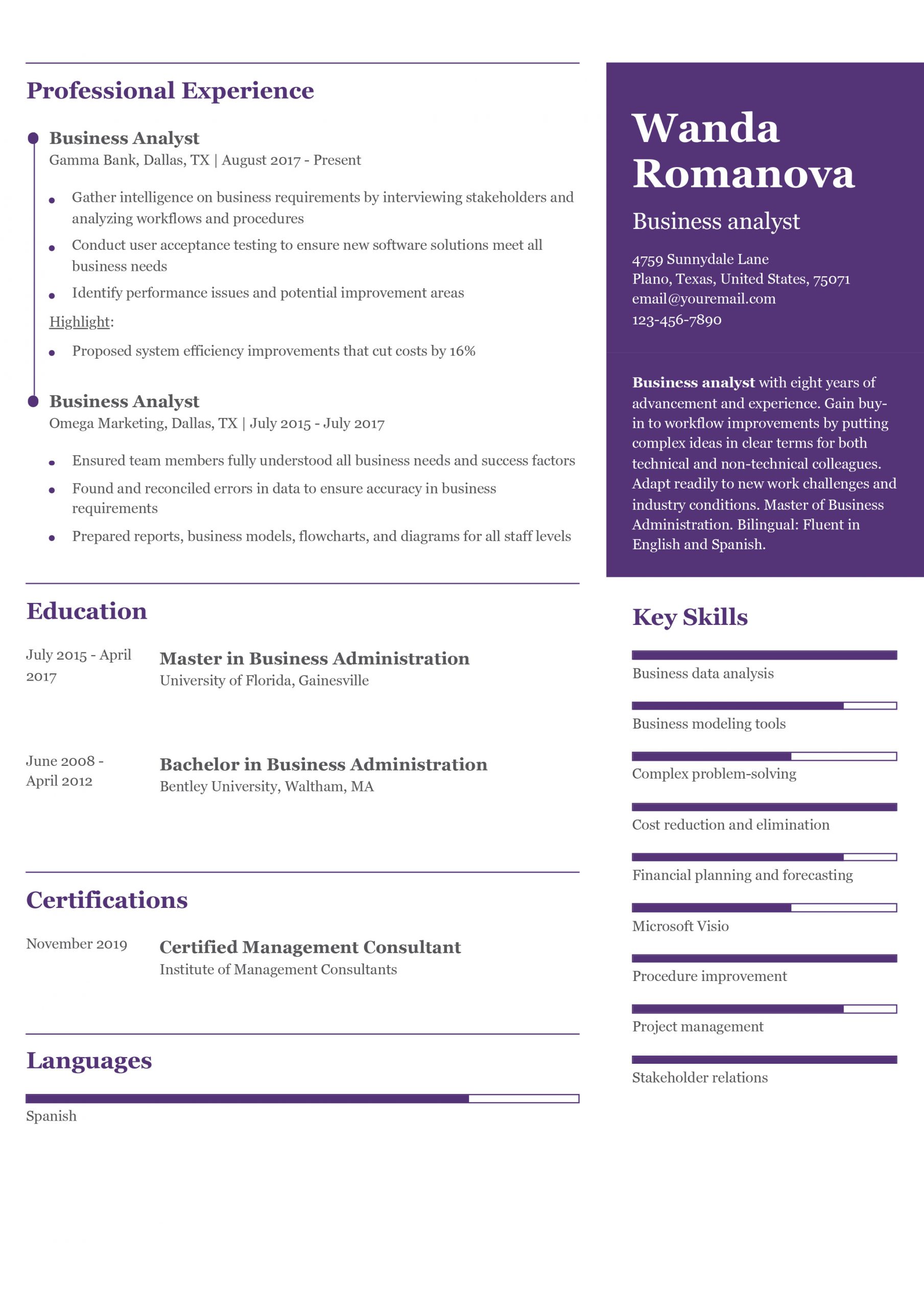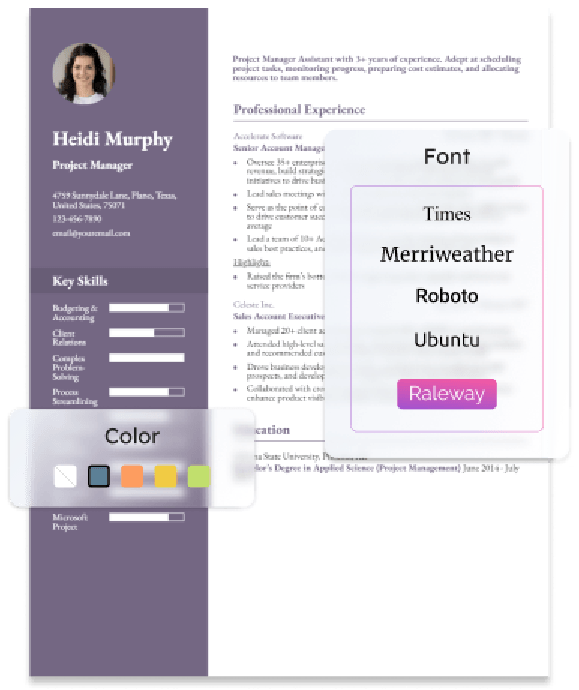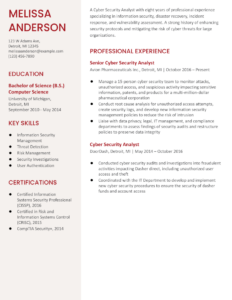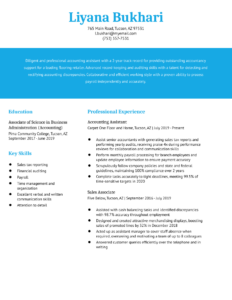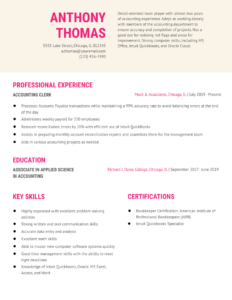How To Write a Business Analyst Resume
To write a good business analyst resume, you must show you can measure performance data, collaborate well with various stakeholders, and drive positive change for organizations. Using the tips below, you can effectively present your skills throughout each section of your resume to improve your chances of getting an interview for your next business analyst job.
- Entry-Level
- Mid-Career
- Senior-Level
1. Create a profile summarizing your business analyst qualifications
A strong profile will catch the hiring manager’s interest by giving the top reasons you excel as a business analyst. What is your approach to monitoring and improving key performance metrics? Why do you feel this method is successful? For example, maybe you have a collaborative style, working with stakeholders at all levels to gain their buy-in to workflow changes and initiatives. Also, don’t be afraid to get specific in your profile. If you’ve repeatedly cut costs or raised efficiency by a certain percentage, that’s a great detail to feature in this section.
Entry-Level Profile Example
Business analyst with experience finding cost-effective solutions for sustained revenue and profit growth. Draw on strong knowledge of tailored software solutions to raise efficiency by more than 10%. Committed to driving positive change for best-in-class tech companies.
Senior-Level Profile Example
Strategic business analyst with over 10 years of experience honing operations and boosting company performance. Ready collaborator who builds productive relationships with diverse team members and stakeholders.
2. Outline your business analyst experience in a compelling list
View the experience section as a chance to give examples of your success in advancing key business transitions. For each relevant job in your recent work history, describe the areas you focused on and how you worked to improve them. What specific changes did you make or recommend, and how did they help the wider organization succeed in the short or long term? For instance, maybe you found ways to pare back operating costs. If so, express the cost reduction as a clear percentage or dollar amount. Or perhaps you provided a review of customer processes that led to higher efficiency and service scores. With quantified examples like these, you can give hiring managers a sense of the value you’d generate for their company.
Mid-Career Experience Example
Business Analyst, Gamma Bank, Dallas, TX | August 2017 to present
- Gather intelligence on business requirements by interviewing stakeholders and analyzing workflows and procedures
- Conduct user acceptance testing to ensure new software solutions meet all business needs
- Identify performance issues and potential improvement areas
Highlight:
- Proposed system efficiency improvements that cut costs by 16%
Senior-Level Experience Example
Business Analyst, Delta Consulting, San Francisco, CA | January 2013 to March 2015
- Translated stakeholder requirements into concrete deliverables such as user cases, functional specifications, and process and data model diagrams
- Provided analytics and decision-support tools to advance clients’ restructuring and consolidation strategies
Highlights:
- Completed in-depth analysis of client tools, programs, and processes and made suggestions that increased revenue by over 8% and efficiency by up to 55%
- Facilitated on-time, under-budget launch of new business software
3. Add business analyst education and certifications
With the education and certifications sections, you can assure employers your change management work has a strong knowledge base. If you studied information science, business administration, or a related topic in college, include that next to your degree title. Also include any relevant master’s degrees or certifications you’ve earned, such as the CMC designation. These advanced credentials will help you show your overall business acumen and ability to work with various stakeholders.
Below are templates and examples to help you format your education and certification details. Note that optional template areas appear in [brackets].
Education
Template
- Degree Name — [Major], School Name, City, ST | [Year]
Example
- Bachelor of Science (BS) — Information Science, University of Colorado Boulder | 2021
Certification
Template
- Certification Name or Title, [Awarding Organization] | [Year]
Example
- Certified Management Consultant, Institute of Management Consultants | 2019
4. Make a list of your business analyst-related skills and proficiencies
Add a “key skills” or “areas of expertise” section to show the various ways you support and guide organizations through change periods. You can also use this section to highlight relevant technical skills like SQL or Microsoft Visio. Below are some common keywords to consider for your key skills section:
| Key Skills and Proficiencies | |
|---|---|
| Business case development | Business needs assessment |
| Change leadership | Change management |
| Complex problem-solving | Cost reduction and elimination |
| Creative problem-solving | Cross-functional coordination |
| Data gathering and analysis | Efficiency improvement |
| Executive consulting | Management consulting |
| Microsoft Excel | Microsoft Visio |
| Organizational development | Project management software |
| Reporting and documentation | Requirement elicitation |
| Revenue and profit growth | Strategy development |
| Task prioritization | Team collaboration |
| Time management | |
How To Pick the Best Business Analyst Resume Template
Business analysts should use a resume template that’s simple and straightforward. Opt for a visual template that lets the hiring manager quickly review your best career details. Select a clear resume font, and avoid any template with an overly colorful or elaborate design.
Business Analyst Text-Only Resume Templates and Examples
- Entry-Level
- Mid-Career
- Senior-Level
Wanda Romanova
(456) 789-0123 | [email protected] | Houston, TX 43210 | www.linkedin.com/example
Profile
Business analyst with eight years of advancement and experience. Gain buy-in to workflow improvements by putting complex ideas in clear terms for both technical and non-technical colleagues. Adapt readily to new work challenges and industry conditions. Master of Business Administration. Bilingual: Fluent in English and Spanish.
Key Skills
- Business data analysis
- Business modeling tools
- Complex problem-solving
- Cost reduction and elimination
- Financial planning and forecasting
- Microsoft Visio
- Procedure improvement
- Project management
- Stakeholder relations
Professional Experience
Business Analyst, Gamma Bank, Dallas, TX | August 2017 to present
- Gather intelligence on business requirements by interviewing stakeholders and analyzing workflows and procedures
- Conduct user acceptance testing to ensure new software solutions meet all business needs
- Identify performance issues and potential improvement areas
Highlight:
- Proposed system efficiency improvements that cut costs by 16%
Business Analyst, Omega Marketing, Dallas, TX | July 2015 to July 2017
- Ensured team members fully understood all business needs and success factors
- Found and reconciled errors in data to ensure accuracy in business requirements
- Prepared reports, business models, flowcharts, and diagrams for all staff levels
Education
Master of Business Administration, University of Florida, Gainesville | 2017
Bachelor of Business Administration, Bentley University, Waltham, MA | 2012
Credential
Certified Management Consultant, Institute of Management Consultants | 2019
Language
Fluency in Spanish
Frequently Asked Questions: Business Analyst Resume Examples and Advice
What are common action verbs for business analyst resumes? -
For business analysts, the best resume verbs will relate to change leadership – for example, “converted,” “created,” “improved,” or “navigated.” But there are various others to describe your duties and contributions in this field. The following list can help you find the right mix of action verbs for your business analyst resume:
| Action Verbs | |
|---|---|
| Advised | Analyzed |
| Assessed | Communicated |
| Converted | Created |
| Diagnosed | Enhanced |
| Evaluated | Facilitated |
| Guided | Honed |
| Implemented | Improved |
| Innovated | Led |
| Managed | Monitored |
| Navigated | Negotiated |
| Organized | Planned |
| Researched | Resolved |
| Reviewed | Simplified |
| Solved | Strategized |
| Streamlined | Supported |
| Tested | Validated |
How do you align your business analyst resume with a job posting?-
The Bureau of Labor Statistics forecasts that jobs for business analysts (also known as management analysts) will increase by about 11% between 2021 and 2031. This growth rate is faster than the average for all U.S. vocations.
You can get more interviews in this growing field if you tailor your resume for each application. One great way to do this is by selectively adding descriptions of the companies where you’ve worked in brackets right next to or below the company name. Company descriptions let you show any similarities between your past employers and the one who posted the job. For example, maybe you’ve worked for companies of a similar size or in a similar market. Or perhaps you’ve worked at companies with a similar mission or leadership philosophy. By working these details into your descriptions, you can make your resume more relevant to the job opening.
What is the best business analyst resume format? -
In nearly all cases, opt for a Combination (or Hybrid) resume because it’s easiest for hiring managers to learn about your relevant skills and experience. It’s also simplest for you to modify based on your job goals.
With the Combination format, you highlight your most relevant skills and experience in your experience or work history section and an intro section. (This combination of work history and intro content is where the format gets its name.) Your resume intro should usually include a profile summary and key skills section, but you may also add an awards or career highlights section.
Craft your perfect resume in minutes
Get 2x more interviews with Resume Builder. Access Pro Plan features for a limited time!

To increase your chances of an interview for business analyst jobs, write and submit a strong cover letter. The key to an effective letter is customizing it based on each job opening. Read our business analyst cover letter guide to learn how. For other related examples, see our data analyst and business cover letter guides.
